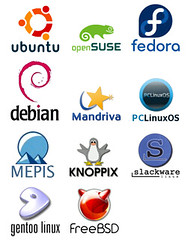
Can you hack in Windows? Yes. Windows is a good operating system, and you can install Python and run programs in C on Windows. But Windows is not Open Source. Windows is distributed in binary, in other words, you can only install Windows and not change nor manipulate the code of the operating system (OS). An open source OS has the option to download the source code and contribute to it by programming features, utilities or tools for it. There are two lessons to be thought in this here skill today, and they go hand in hand. One, if you want to be a hacker, you have use and contribute to the Free and Open Source Software (FOSS). This is a cultural trait. You can contribute in such a community as SourceForge, where you can download and develop FOSS. Hackers share software with their community, they test FOSS they didn’t program, write documentation for it, debug it, and eventually, write their own open source software. That is one reason why hackers use a FOSS UNIX Operating System. There are different variants of UNIX or UX operating systems, free or proprietary such as AIX, BSD, Solaris, SCO, HP-UX and the most popular, Linux, which leads us to the second lesson.
UNIX has been the operating system for scientist by scientists. It goes without saying, that hacking is a science. In the days before the Mac OS and Windows, UNIX was king and in the 1970’s, UNIX creators at Bell Labs, provided the source code to the OS to be taught in universities or enhanced by researchers. A US born professor at Vrije University in Amsterdam wrote his own UNIX (MINIX, or Minimal UNIX) and provided the 12,000 lines of C and Assembly code when you bought his book “’Operating Systems: Design and Implementation” by Andrew S. Tanenbaum. MINIX was created to teach university students how an operating system works. One student, Linus Torvalds, took the source code provided by the book in floppy disks, programmed a kernel, and according to his newsgroup post on compo.os.minix took “feedback on things people like/dislike in minix” and programmed “features most people would want”. As he shared it with the online community, like a good hacker boy that he was, it gained a lot of attention and within one month of releasing Linux 0.01 (or Linus UX) on the Internet, many hackers contributed to 0.02. Eventually Linux grew into the hundreds of Linux distributions today.
There are other Free OSS UNIX operating systems around that are used for hacking, these include FreeBSD and OpenSolaris. However, the importance to becoming a good hacker is to understand UNIX and how it works on the Internet. To do so, one must know the UNIX and Internet Fundamentals. The question here is now, what do you want read about next: should I contribute in detail on programming Python, or would you rather me show you the different ways to run Linux, including Live Distro, virtual or full installation or running Linux off a network. My next part of this series will depend on the reader, this is subliminally training you to a hacker lessons learned, contribute to this by commenting, and you’re on your way to becoming a hacker.
